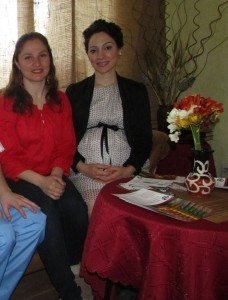Special for the Armenian Weekly
At some point during my time in Armenia, I must have accepted that having constant back pain was normal. I realized that I had been letting my posture get into the “curved” shape our nenes had always warned us about. So when a friend posted on Facebook saying there was a cancellation at a local massage studio, I took her up on the available spot without any hesitation.

I had heard of the studio before, knew the person running it, and decided I could find out more when I went in nervously for my first ever one-hour intensive full-body massage.
I walked into a cozy and warm office space, and was greeted by Mariam Dilbandyan, the founder of the massage studio. She enthusiastically gave me an introduction to the place and introduced me to my massage therapist, Artur. The studio is called Seeing Hands, and the massage therapists are men and women who are visually impaired. Mariam had just come back from a 10-day conference where representatives from different countries discussed initiatives for people with disabilities, while comparing different cultural outlooks on disability. Unsurprisingly, formerly Soviet countries like Armenia have quite a poor track record for even the most basic requirements and necessities.
The room had lit candles, soft music, and cozy decorations, and soon I had no choice but to feel calm. A couple of minutes into the massage, Artur asked if I was a runner. He told me he could tell right away from the shape of my muscles and said I had the Armenian equivalent of “thighs of steel,” which I happily agreed with. He mentioned that he used to run in the mornings as well, before a bicycle accident left him partially blind. We quickly bonded over running, nutrition, going to shugas, and him laughing at my knowledge (and perhaps pronunciation) of six Russian words. He confirmed my fears about my terrible posture, and paid special attention to those areas, always making sure it wasn’t painful.

Once it was over, I could barely lift myself off of the table. My back felt incredible, and I was in a state of relaxation I had never dreamed possible. As I walked out of the massage room, Mariam greeted me again, poured me a cup of tea, and went over my assessment with Artur as she placed a blanket over me. They recommended four more sessions to properly restore/improve my posture. Mariam went over the importance of good posture for breathing as well as for our organs, and Artur showed me the areas on my back he felt were the most tense. The follow-up appointments would be focused on intensive massages on my back, and Artur assured me that afterwards sitting slouched would actually feel uncomfortable. I was sold.
Mariam shared that her mother was a masseuse, and as a result, at a very early age, she understood the importance of good posture and regular massages. She told me that “massage culture” was not very popular in Armenia, and she was happy to be promoting its importance. There are 6,000 blind people in Armenia, and only about 20-25 of them have jobs. When I asked her how she thought of the idea for Seeing Hands, she responded, “We know that when one sense is taken away—in this case, sight—others become heightened—in this case, touch. I realized that it was a perfect match. Through my work with an NGO for the visually impaired, I found interested individuals and the project began in May of 2014.”
The trainings included not only the standard “Soviet” relaxation massage techniques, but also a mix of Chinese and eastern medical massages. She felt that Armenian society as she knew it was not ready to accept people with disabilities, hence the low rate of employment. She wanted to break the stereotypes surrounding disability. “The problem with the treatment of disabled people in Armenia is twofold: They are often stigmatized by society, and then sheltered by their families. This created challenges during trainings. But I knew they had skills and I wanted them to use them. In this sense, Seeing Hands has two goals: to be a sustainable business and to set an example,” Mariam said.
Mariam noted that for many of the studio’s customers—a mix of local Armenians, diasporans, and foreigners—a massage at Seeing Hands was the first time they had ever received a service from someone who was disabled, and said she hopes this will help end the idea of disabled people being seen as ‘the other.’
Seeing Hands currently employs five massage therapists—four men and one woman, with two more in the process of being trained. Some of them have been blind since birth, some from recent accidents; some are completely blind, and some partially. Mariam noted that a disability could happen to anyone, as is the case with some of her workers, and that it could change a person’s entire life. But she didn’t want it to close all of their doors.

When talking with the massage therapists, they said that the work gave them a sense of self-confidence because they were able to earn a living for themselves and, more importantly, be integrated into society. Artur stressed that the integration aspect is what many NGOs in Armenia neglect, and yet it is actually one of the most important areas to focus on. Mariam noted that for many of the studio’s customers—a mix of local Armenians, diasporans, and foreigners—a massage at Seeing Hands was the first time they had ever received a service from someone who was disabled, and said she hopes this will help end the idea of disabled people being seen as “the other.”
The future of Seeing Hands is bright. Mariam hopes to expand the business to neighboring countries, and is currently working with an NGO in Georgia to have a chapter established there. She also hopes to begin an exchange program with different countries to train massage therapists, and to introduce “office massages” in Armenia.
Although I have “graduated” from my initial five sessions, I still go to Seeing Hands regularly for high-quality personalized massages that have improved my back, my posture, and surprisingly even my Russian!


This article reminds me of the article “healing pasadena one armenian at a time” (http://www.reporter.am/pdfs/B0209-W.pdf), where Shahe Jierian, of Pasadena, with his rough-around-the-edges demeanor, raspy voice, and humor, defied the stereotypical image of a spiritual healer or medicine man.
hoy hoy hoy
Interesting. Blind masseurs have a long tradition. Under the Shogun in Japan, the job of masseur was restricted to the blind as a monopoly, to provide them an honorable means of employment. I’ve also seen blind masseurs outside temples in Taiwan. It’s a job the blind can excel at, just as the blind can be effective wrestlers. Kudos for the article.
Wow, though I’ve never had any interest in massages, and have never gotten one, this sounds like a truly GREAT idea/program. When I get to go to Yerevan again, I just might be tempted to try it out!
This is really fantastic!
This is wonderful! I knew a blind man was a massage therapist. He was very good! Thank you for employing people they care blind. Teaching them massage us an AMAZING gift to help others! ❤